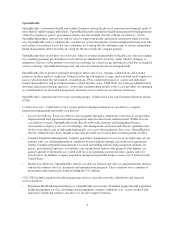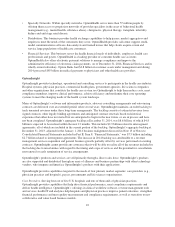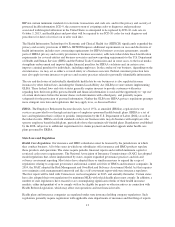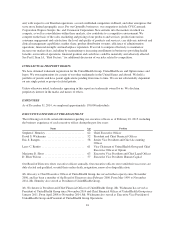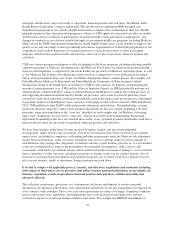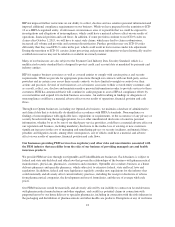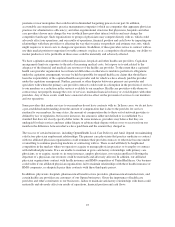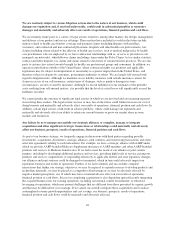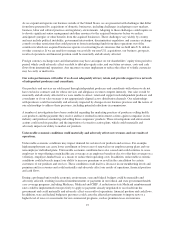United Healthcare 2014 Annual Report Download - page 21
Download and view the complete annual report
Please find page 21 of the 2014 United Healthcare annual report below. You can navigate through the pages in the report by either clicking on the pages listed below, or by using the keyword search tool below to find specific information within the annual report.Our business activities are highly regulated and new laws or regulations or changes in existing laws or
regulations or their enforcement or application could materially and adversely affect our business.
We are regulated by federal, state and local governments in the United States and other countries where we do
business. Our insurance and HMO subsidiaries must be licensed by and are subject to regulation in the
jurisdictions in which they conduct business. For example, states require periodic financial reports and enforce
minimum capital or restricted cash reserve requirements. Health plans and insurance companies are also
regulated under state insurance holding company regulations, and some of our activities may be subject to other
health care-related regulations and requirements, including those relating to PPOs, MCOs, UR and TPA-related
regulations and licensure requirements. Some of our UnitedHealthcare and Optum businesses hold or provide
services related to government contracts and are subject to U.S. federal and state and non-U.S. self-referral, anti-
kickback, medical necessity, risk adjustment, false claims, and other laws and regulations governing government
contractors and the use of government funds. In addition, under state guaranty fund laws, certain insurance
companies can be assessed (up to prescribed limits) for certain obligations to the policyholders and claimants of
insolvent insurance companies that write the same line or similar lines of business. Any such assessment could
expose our insurance entities to the risk of paying a portion of an insolvent insurance company’s claims through
state guaranty association assessments in future periods.
Certain of our businesses provide products or services to various government agencies. Our relationships with
these government agencies are subject to the terms of contracts that we hold with the agencies and to laws and
regulations regarding government contracts. Among others, certain laws and regulations restrict or prohibit
companies from performing work for government agencies that might be viewed as an actual or potential conflict
of interest. These laws may limit our ability to pursue and perform certain types of work, thereby materially and
adversely affecting our results of operations, financial position and cash flows.
Certain of our Optum businesses are also subject to regulations, which are distinct from those faced by our
insurance and HMO subsidiaries, including, for example, FDA regulations, state telemedicine regulations, debt
collection laws, banking regulations, distributor and producer licensing requirements, state corporate practice of
medicine doctrines, fee-splitting rules, health care facility licensure and certificate of need requirements, some of
which could impact our relationships with physicians, hospitals and customers. These risks and uncertainties may
materially and adversely affect our ability to market our products and services, or to do so at targeted margins, or
may increase the regulatory burdens under which we operate.
The laws and rules governing our business and interpretations of those laws and rules are subject to frequent
change, and the integration into our businesses of entities that we acquire may affect the way in which existing
laws and rules apply to us, including subjecting us to laws and rules that did not previously apply to us. The
broad latitude given to the agencies administering, interpreting and enforcing current and future regulations
governing our business could force us to change how we do business, restrict revenue and enrollment growth,
increase our health care and administrative costs and capital requirements, or expose us to increased liability in
courts for coverage determinations, contract interpretation and other actions.
We must also obtain and maintain regulatory approvals to market many of our products, increase prices for
certain regulated products, and complete certain acquisitions and dispositions or integrate certain acquisitions.
For example, premium rates for our health insurance and managed care products are subject to regulatory review
or approval in many states and by the federal government. Additionally, we must submit data on all proposed rate
increases to HHS for monitoring purposes on many of our products. Geographic and product expansions may be
subject to state and federal regulatory approvals. Delays in obtaining necessary approvals or our failure to obtain
or maintain adequate approvals could materially and adversely affect our results of operations, financial position
and cash flows.
Some of our businesses operate internationally and consequently face political, economic, legal, compliance,
regulatory, operational and other risks and exposures that are unique and vary by jurisdiction. The regulatory
19


